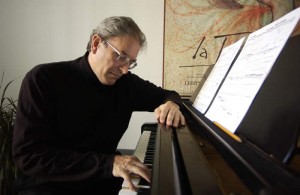A Southerly Cultural Travel Journal Vol. 2.
The train ride into St. Louis was oddy disorienting. Suddenly the austere magnificence of the St. Louis Gateway Arch appeared, lording over the downtown skyline like an abstracted guardian angel. But it was moving as I looked, slowly rotating. Now it did seem like a living being, with its sleek, sloping shoulders, surveying the cityscape. Apparently the train track circles the giant structure, providing a shifting, multidirectional perspective that local motorists lack the luxury of. The optical phenomena cast a slight aura of refracted reality over the city. Plus, I was about to step inside Outside the Box.
Later, as dusk fell, I wended my way through downtown in a rented car, feeling like a partially blind rat in a maze. I was searching for a major event of Southern Illinois University – Carbondale’s annual Outside the Box new music festival. The event would present the Altgeld Chamber Players performing music by (full disclosure) one of my oldest friends, Frank Stemper, a gifted and highly skilled composer more widely performed in Europe and Mexico than in the U.S.
Unreliable Google map directions landed me in a dead-end alley where I found a man in a wheelchair with a heavy speech impediment. No, he didn’t leap up to mug me — the kindness of Missouri strangers prevailed for the first of several times on this trip. His garbled utterances and gesticulations somehow sent me in the right direction and I soon happened upon the Kranzberg Arts Center.
I was too late to hear the opening piece, which I am grateful for — that is, I was spared sympathetic anguish for what Stemper surely suffered. Playing piano, he had to stop the concert in the third movement of the piece, his right arm throbbing in pain. He’d been rigorously practicing for another work to be featured in the festival (Arnold Schoenberg’s Pierrot Lunaire) — which apparently triggered the injury. When he walked away from the piano before the surprised audience, the Schoenberg performance was doomed to cancellation.
Even without one of the modern music master’s most accessible and captivating works, this would prove an excellent festival.
Given the bias of a long friendship, I nevertheless felt this was one and the finest concerts of contemporary music I’d heard in quite some time. Stemper’s music has matured over the years without losing its mischievousness, with many of its strongest qualities intact and in bold, sharp relief.
In his chamber music, those qualities include a deft juxtaposing of instrumental voices through poised rhythmic tension and release. The tension builds through striking and startling phrase spacing and meshing, sharp accenting and pungent harmonies. A key is the deft and surprising use of silence, what a sculptor would call negative space, or how a draftsman lifts the pencil off the paper at just the right point. The final effect in most each of these pieces was extremely satisfying. I glibly told Stemper his duo for piano and flute, Bind 1, might be subtitled “Hines 57 Varieties of Grace Notes.” In fact, he never smothers his music in cheap sauce. Rather the pauses and spaces flitted with the notated sounds like sly bats in one’s mental belfry. One was teased, slightly maddened but also piquantly amused, sometimes by Thelonious Monk-ish trap-doors of sudden emptiness. Enjoyment assumes one hasn’t a phobia of contemporary composed music, a corner of our culture still stigmatized by foreboding perceptions (some duly earned), not unlike those mystifying winged inhabitants of darkness.
As it was, Stemper admitted later to less than total satisfaction with the performance of Bind 1, which is written to actually be funky, but at a very slow tempo, a combination difficult for most musicians, classical or otherwise, to execute. Stemper, with a strong jazz background and influence, recalled Ray Charles exhorting his musicians to slow down, to plumb the depths of funk. It’s perhaps a measure of the composer’s evolution that so much emerged of value, despite this performance flaw. An ensuing duet for baritone sax and drummer emitted more overt musical jokes, which famed musical jokemeister Josef Haydn might’ve appreciated if he could get his classical head around an unruly set of traps drums.
A concert highlight concluded the first half with soprano Lucy Shelton uncannily inhabiting the delightfully eccentric a capella Inner Voices. It’s a phantasmagoria of expressive quirks and tics that characteristically had audience perceptions off balance with facial and bodily poses, aural collapses, primps and madcap wordless asides. It demonstrated that the best singers, such as Shelton, are nearly as good as actors.
Another Stemper piece Rope, is influenced by Alfred Hitchcock’s same-titled 1948 cinematic experiment, which was filmed in one no-cut sequence, and which tells the story of two fiendish intellectuals committing ritual murder just to prove that they can. Here the instrumental trio’s seamless accumulation of tension was interposed by a moments of deceptive lyricism.
As the composer notes in the program, with Hitchcockian relish, the piece metaphorically uncovers sinister first-degree murder “even though the guilty party is merely being true to his internal instincts, having nothing to do with learned behaviors, and therefore behaving honorably in is particular musical microcosm, even know this instinct is in fact dangerous psychopathic mental illness.”
I need to hear the piece again to be wholly convinced of all that, but the threatening aura and sense of interweaving dark deeds surely prevailed.
The piece titled 1963 is dedicated to the composer’s late father, a psychiatrist, set to a poem by the composer’s son, Frank Stemper Jr., and wrought with phrases such as “rock salt under worn wingtips” and “nurses weeping over bright countertops and dim headlines.” The sonorities and the vignette blend irony and tenderness, recounting the day of John F. Kennedy’s assassination. With Shelton’s vocal daubing, the probing psychic transference among three Stemper generations may have raised a ghost or two from rock-salted slumber.
— Kevin Lynch



